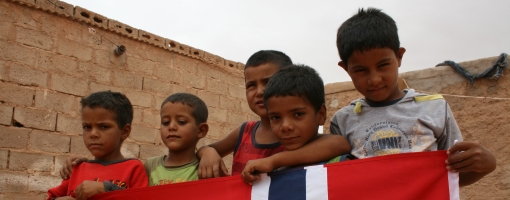
Norwegian Minister of Foreign Affairs underlines that the wishes of the Sahrawis must be taken into account upon undertaking business in the territory of Western Sahara.
In a statement given by the Deputy Minister mid June, it was clarified that whenever the Norwegian government refers to "the local population" in Western Sahara “we of course refer to the Sahrawi people”.
The debate has now continued between Liberal parliamentarian Trine Skei Grande, and the the Norwegian minister for foreign affairs.
Unofficial translation to English below made by the Norwegian Support Committee for Western Sahara.
Read original debate (in Norwegian).
Question by Member of Parliament Trine Skei Grande (Liberal Party) to the Minister of Foreign Affairs, 21 June 2011.
"Can the Minister of Foreign Affairs confirm that the Government considers Western Sahara to be under Moroccan annexation, that this annexation is not recognised and thus is considered illegitimate by the Government, and can the Minister guarantee that the Ministry of Foreign Affairs will now actively advise against Norwegian commercial activities in connection with Western Sahara?"
Minister of Foreign Affairs Jonas Gahr Støre's answer, 27 June 2011:
"The Government's Western Sahara policy remains unchanged. Norway supports the UNs efforts to achieve a political solution that entails self-determination for the people of Western Sahara, and we urge the parties to enter into direct negotiations without preconditions.
Since Morocco does not exercise internationally recognised sovereignty over Western Sahara, Norway has never considered Western Sahara a part of Morocco's territory. In the UN, the territory has status as non-self-governing, and, like most other countries, Norway does not recognise Morocco's declaration that Western Sahara is a part of the Moroccan state.
This entails consequently that Norway does not recognise Morocco's annexation of Western Sahara and that we consider it illegitimate. This policy has remained constant during all Norwegian governments since the conflict arose in the 1970s. As I have also previously clarified for the Parliament, this entails among other things that the free trade agreement between EFTA and Morocco is not in force for Western Sahara (parliamentary question by Member of Parliament Dagfinn Høybråten (Christian Democratic Party) about EFTA's free trade agreements with Morocco and Israel, respectively, on 11 May 2010).
Western Sahara's unresolved status entails further that exploitation of resources in the area must, according to international law, be carried out in accordance with the wishes and interests of the local population. This, together with the consideration of avoiding behaviour that might be cited in support of a particular outcome of the UN's negotiation process or be perceived as a legitimisation of the situation in Western Sahara, forms the basis for the Government's dissuasion against commercial activity in Western Sahara.
I do not share the opinion that the the bureaucracy in the Ministry of Foreign Affairs is supposed to have expressed to the business community another attitude than that of the members of the Government in this matter. As I emphasised in my answer in the Parliament to the interpellation by MP Trine Skei Grande in May of 2010, the Government's attitude to commercial activities in Western Sahara is clear and well known: the question has been commented on in the media frequently during recent years. The dissuasion has since 2007 been available at the Government's web site. All business people are welcome to seek advise from the Ministry of Foreign Affairs or to the embassy in Rabat if they have questions about activities in the area, and many companies get in touch every year for such purposes. The White Paper on Corporate Social Responsibility, in which the Government's dissuasion against economic activity in Western Sahara is explicitly mentioned, is also available on the Internet. The dissuasion is furthermore constantly passed on in connection with contact between Norwegian and Moroccan authorities with regard to business activities - the last time was in Morocco in June of 2011.
The Government will continue to actively inform about dissuasion in the same manner as earlier."
NY Check new Western Sahara poster!
“Try to Visit Western Sahara”…
The Security Council fails Western Sahara and international law
On 31 October 2025, a new resolution was adopted in the UN Security Council calling on the Saharawis to negotiate a solution that would entail their incorporation into the occupying power, Morocco.
Saharawis Demonstrate Against Trump Proposal
The United States has proposed in a meeting of the UN Security Council on Thursday that the occupied Western Sahara be incorporated into Morocco.
Skretting Turkey misled about sustainability
Dutch-Norwegian fish feed giant admits using conflict fishmeal from occupied Western Sahara. Last month, it removed a fake sustainability claim from its website.



